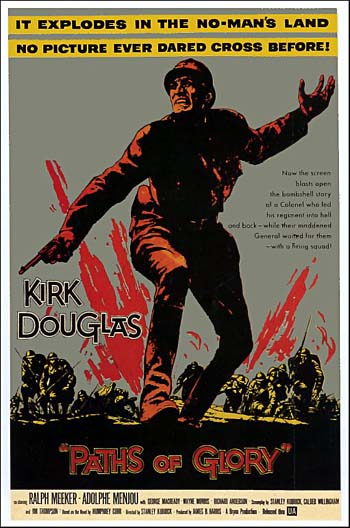
War is hell. This is nothing new to the movies. But in many antiwar movies, soldiers at least have their buddies and a good commanding officer or two to fall back upon. Paths of Glory shows what happens when war leaves one all alone.
The story is simple: It is 1916, two years into World War I, and the French and the Germans have been fighting bitterly, with thousands upon thousands of men dying for mere yards of advancement. French commanders want to take an important, strategic spot -- the Ant Hill -- and order Gen. Mireau (George Macready) to get it. Mireau commands Col. Dax (Kirk Douglas), who operates one of the bravest, most decorated groups in the French military, to run the attack.
Dax knows it is a suicide mission. His men are tired, battered and dying rapidly. But he follows orders, because he is a good soldier. The attack then fails miserably. To protect his reputation, Mireau demands to see soldiers from Dax's unit executed. Gen. Broulard (Adolphe Menjou) talks him down. In a compromise, three soldiers -- one from each of Dax's units -- will be shot dead for cowardice.
What makes Paths of Glory succeed is it is not just the cruelty of the violence that forms its argument against war. To the French commanders, the war is less about protecting France and more about bravado and macho pride. Broulard goads Mireau into taking on the deadly mission by not so subtly hinting that a promotion and medals will be in it for the general who successfully takes the Ant Hill. Mireau puts up a half-hearted fight -- "What are promotions against the lives of my men?" -- but the decision has already been made in his mind.
It is this bravado and macho pride that also leads to the greatest cruelty in the movie. Mireau cannot stand the wound his pride has sustained. He cannot look his superiors in the eye without knowing some form of justice has won out. He does not care who is killed; he is satisfied someone will die for the slap to his perfect reputation. Macready succeeds in fleshing out what a hateful bastard Mireau is. He slinks in the background, a smug and arrogant smirk perpetually plastered on his face, and always with a shawl perched upon his shoulders to make him look more like a war hero.
Douglas is his perfect opposite. He is cool and calm, knowing he has to be in command if he wants to inspire his soldiers and keep them alive, but one can see in his eyes how seethes at the injustice of what happens. Dax fights and fights for the lives of his men but cannot win; still, he keeps his cool because, for the sake of his men, he cannot afford to lose himself. Douglas brings the perfect combo of toughness and sincerity Dax needs to have.
The movie also easily separates the men at the top from the grunts at the bottom. Mireau and Broulard are almost always seen in an extravagant mansion, which is well-kept and orderly. In one particularly telling scene, the director, Stanley Kubrick, parallels the emotional horrors of the three soldiers who are awaiting their death in prison with a happy-go-lucky dance in which the generals cavort with beautiful women.
But just because there is a lot of focus on horrors outside the battlefield does not mean Kubrick flinches from showing the evils of war in action. The battle to take the Ant Hill is horrifying to watch in the very worst way. Bombs and mines go off in every direction. Bullets fly everywhere and find many targets. The terrain is tough and unforgiving. The only way to stay alive is to plunge oneself farther into the madness.
It is not as bloody and graphic as, say, Saving Private Ryan's opening scene, but it does not have to be. With a few simple techniques -- an unwieldy camera, jarring cuts and faraway angles -- the war becomes as terrible as anything a person could ever film. What adds to this is the sound of it all, which is liable to haunt a person's soul for hours after hearing it. The explosions, the zings of the bullets and shouts of men coalesce into a monotone drone that gives war the voice of a monster. Listening to that is like watching this army fight a creature out of a horror movie. It is frightening.
Paths of Glory tells its story straight and simple without pulling any punches. All the horror is there -- the cynicism of the generals, the hopelessness of survival and the heart-twisting realization of utter solitude. The only glimmer of hope in the movie, which is in itself a cry against blind patriotism, is immediately swallowed up by a simple sentence: "We have orders to move back to the front immediately."
EDIT: Once again, retroactive scene addition. In these bit from Paths of Glory, Col. Dax pleads with the corrupt military trial judges to show mercy on three soldiers they are railroading into taking blame for the failed charge on the Ant Hill.